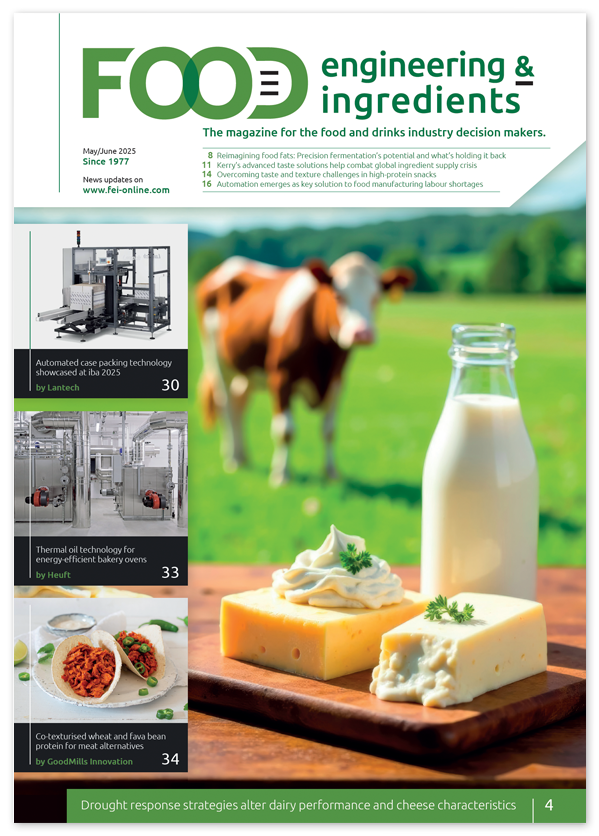Savouring tomorrow
Sarah Stocco, solution consultant, Infor, looks at the fusion of product lifecycle management and Artificial Intelligence in crafting the recipe of innovation.
As the food and beverage industry continues to evolve, the convergence of Product Lifecycle Management (PLM) and Artificial Intelligence (AI) is about to change how we create and experience our culinary products. This fusion goes beyond mere process enhancement; it’s about enriching the essence of our dining experiences. It transforms the traditional farm-to-fork journey into an orchestrated experience of taste, health and sustainability, turning each product into a story of innovation and anticipation.
Understanding the ingredients: data and AI
Integrating AI into PLM in the food and beverage sector resembles the crafting of a gastronomic recipe. In this process, the abundance of high-quality data serves as the foundational ingredient. Just as a chef relies on the finest ingredients to ensure culinary excellence, the effectiveness of AI depends on the richness, relevance and freshness of data. As PLM serves as the central hub for managing all product-related data throughout its lifecycle, it forms the basis of all AI-driven analyses and predictions, shaping the future of food product development.
Preparation: data processing by AI
The data preparation stage in PLM, using version controls and workflow validations, mirrors the intricate preparation of ingredients in culinary arts. This stage involves cleaning, organising and transforming raw data into a structured format that is suitable for AI processing. Just as how ingredients are prepared can define the success of a dish, the method of data preparation is critical in determining the effectiveness of AI applications in PLM. This meticulous process ensures that the AI systems have the best possible foundation to work from.
Cooking: implementing AI in PLM
Implementing AI within PLM is the cooking stage in gastronomy. AI is used to enhance various aspects of product development, from improving product quality and ensuring compliance to significantly reducing the time-to-market. AI can, for example, assist in refining recipes to optimise nutrition, cost and flavour, and collaborate with PLM to integrate these fine-tuned formulations into a streamlined product development process. When it comes to regulatory compliance, AI acts as a meticulous sous chef automating checks and ensuring each recipe is perfectly compliant. Meanwhile, PLM operates like a chef’s logbook, maintaining a detailed record for audits and submissions: a seamless presentation of compliance in a perfectly plated dish.
Tasting: evaluation and iteration
The release of new products and the collection of consumer feedback is comparable to the tasting phase in the culinary world. Just as a chef values feedback to refine dishes, businesses utilise market responses to iteratively improve their offerings. This phase is essential for continuous improvement, helping align products with changing consumer tastes and market trends. AI tools play a critical role in this process, analysing consumer feedback and market data to provide insights that drive product development and innovation.
Continuous innovation in AI-powered PLM is like a chef applying the final touches to a dish. Embracing new technologies and evolving AI strategies help businesses stay at the cutting edge of the industry. This is how a chef experiments with new flavours and cooking techniques, constantly pushing the boundaries of culinary art.
Towards a flavourful and sustainable future
The integration of PLM and AI in the food and beverage industry signifies a move towards a future where innovation, efficiency and sustainability are key. Much like a great chef creates cuisine that delights and respects the environment, this fusion of technology and management practices promises a flavourful and sustainable future for the industry. It transforms challenges into opportunities, setting new standards for efficiency, customisation and responsiveness to market needs.
The analogy to culinary arts not only makes these concepts accessible but also highlights the creativity and precision required in both fields. AI will not replace a chef. Instead, much like a kitchen brigade, it will assist with the chef’s daily tasks, giving them more time and resources to express their creativity.
As PLM continues to embrace AI, the industry will soon see the benefits of improved efficiency, reduced environmental impact and enhanced consumer satisfaction, announcing the beginning of a new era of innovation and excellence in the food and beverage sector.




